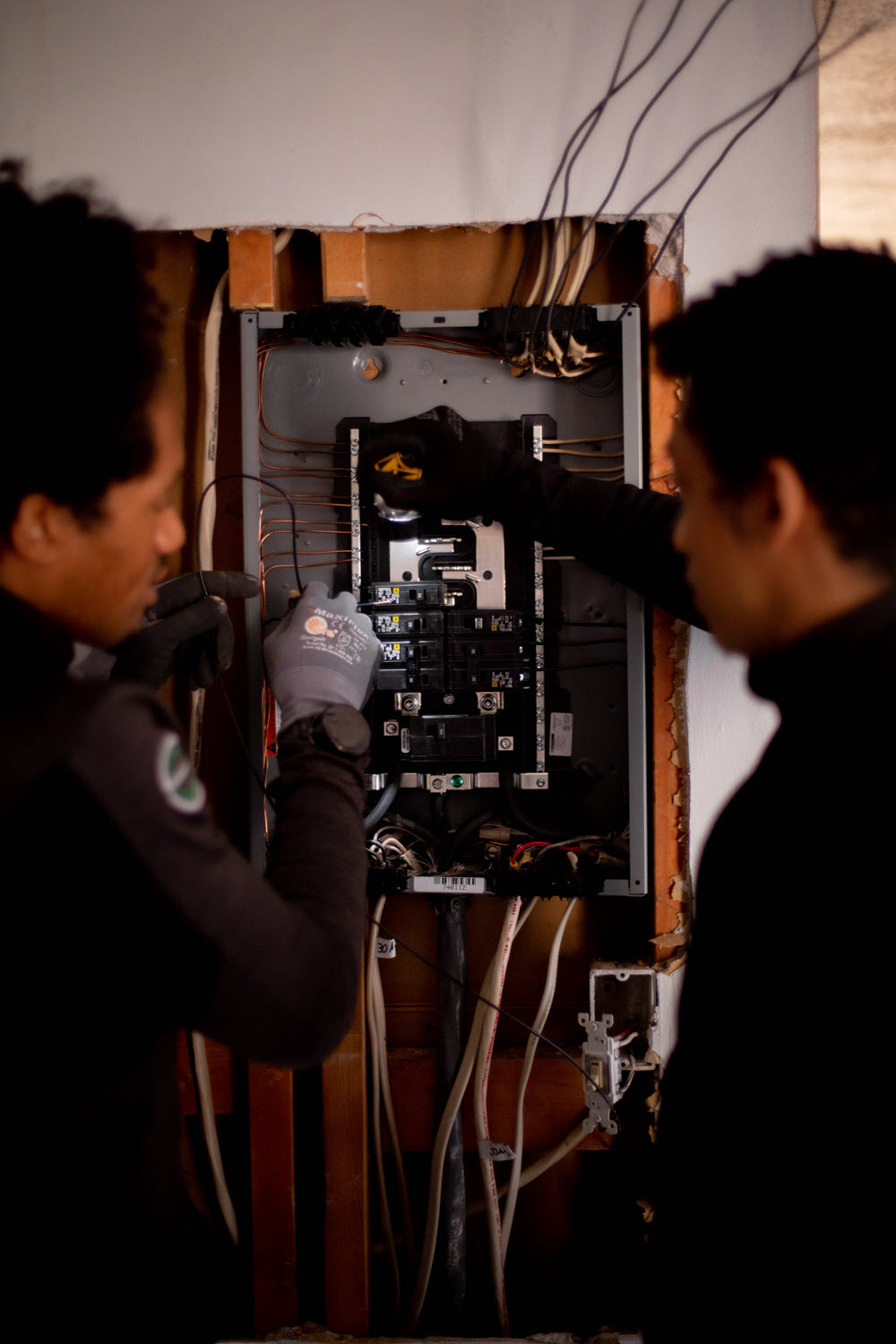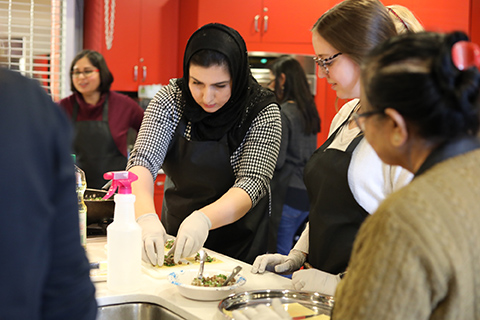Start:ME
The StartMicro Enterprise Accelerator Program (Start:ME), founded in 2013, is a free, intensive, 14-session business- training program for promising small businesses in Clarkston, East Lake, and Southside Atlanta that provides entrepreneurs the tools and connections necessary to build and grow successful businesses.
Emory's Goizueta Business School delivers the program in partnership with several community nonprofit organizations, including East Lake Foundation, Friends of Refugees, Focused Community Strategies, and Purpose Built Schools Atlanta, as well as more than 75 volunteer business mentors.
In response to the COVID-19 crisis, Start:ME has created a resource page for small businesses in Atlanta to learn more about COVID-19 business-continuity support. Additionally, a momentum fund has been created to provide emergency help for small-business owners.
Outcomes
Start:Me has served more than 200 small businesses, created or retained 338 jobs, and helped to generate $7.9 million in annual revenue.
Bringing Light and Love:
A Southside Atlanta Electrician Builds His Dream Business

Musa Abdus-Saboor, owner of Saboor Construction, describes the advice he received through Start:ME as "invaluable" and the mentors and small-business owners he met through the program as "family."
Stephen Nowland/Emory University
Musa Abdus-Saboor knew how to be an electrician. He learned at his father’s knee, helping to carry his tools and tagging along to job sites with his brothers.
“I’ve got the technical expertise,” says Saboor, founder of Saboor Construction, sitting at a table in one of the 70 Glenrose Gardens apartments he and his team are rewiring in South Atlanta. “My father was an electrician; I’m a licensed master electrician. My two brothers are also electricians.”
As soon as Saboor graduated from high school, he joined the International Brotherhood of Electrical Workers, getting lots of hands-on and technical education. He then worked for an electric contractor for 14 years but “really wanted to steer my own ship and my own life,” he says.
A father of three married to his high school sweetheart, attorney Kinda Abdus-Saboor, he knew he had the talent and drive. And, with his father and brothers, plenty of family support as an electrical contractor.
What he didn’t fully understand were the intricacies of running a business: managing subcontractors, keeping up with federal regulations, setting price points and accurately estimating company overhead, coming up with a marketing strategy.
“That’s why Start:ME was invaluable,” Saboor says. “Smaller contractors can go under pretty easily. You don’t want to bite off too much too soon.”
Saboor was part of the 2018 Southside cohort and keeps in touch with many of the mentors and fellow small business owners he met through the program. “We’re like a family, our network has people from accounting, marketing, so many different fields and areas of expertise,” he says.
Working toward his dream has many rewards, even though workweeks can be long—70 to 80 hours—and challenging, says Saboor, who wears a “Team Saboor” black shirt along with each of his crew members.
His Start:ME cohort continues to meet once a month to share challenges, troubleshoot, celebrate victories, and vent. “It’s very therapeutic,” he says. “The love in this program is amazing.”
As an electrician, I consider myself a superhero, surgeon, and rock star. A superhero because we save lives—there are thousands of electrical fires every year, some of which result in deaths, and we catch that before it happens. A surgeon because the electrical current flowing through the wires of a building is similar to the blood flow in the human body, and we help keep it healthy. And a rock star because we put on a show every single time.
Amani Catering Company: Employing and Empowering Immigrant and Refugee Women

Shaista Amani, the founder of Amani Catering Company, notes that Start:Me assisted with "everything from a business plan to branding, from social media outreach to assisting me in understanding what it will take to find a suitable kitchen."
Marjan Nadir, Economic Empowerment Coordinator, Refugee Women's Network
In the spacious kitchen at the Decatur Recreation Center, Shaista Amani patiently demonstrates how to make Afghan dumplings by pinching the slippery wonton wrappers over a savory spoonful of ground beef, onions, and herbs, then topping them with homemade tomato sauce and yogurt.
“We use starters in our yogurt, and I couldn’t get any of the ones I bought here to work,” says Amani, who resettled in 2017 in Clarkston, Georgia, with her family from Afghanistan. “So a friend from Afghanistan brought me a yogurt starter and it worked perfectly.”
The cooking class, part of the Cooking with Refugee and Immigrant Women series hosted by the Chef’s Club, is held monthly at the recreation center. Tickets require a $55 donation, and it includes the hands-on class, a detailed ingredients list and recipes, and a generous tasting of all the prepared foods (events@riwn.org).
Teaching a cooking class is a natural extension of Amani’s passion for sharing her culture’s cuisine, which started with preparing an Afghani dinner every Friday for friends and neighbors and culminated in her starting her own business, Amani Catering Company.
Being a business owner, especially one in the US, was a new experience for her, so she was thrilled to be selected for Emory’s 2019 Start:ME program, which helps small businesses in local Atlanta communities and educates new business owners. Many of the businesses are women- or minority-owned.
“The program was so helpful to me,” says Amani, who along with Barbara Murphy received a starter grant for the catering company. “They helped with everything from a business plan to branding, from social media outreach to assisting me in understanding what it will take to find a suitable kitchen.”
Amani doesn’t eat out much because she enjoys cooking. In her village, everyone took turns cooking, and they would regularly have dinners for 60 to 80 guests. “I am used to cooking for a large number of people,” she says. “We have a tradition in Afghanistan that once or twice a month, your relatives come over for a meal and you return that visit over a meal at their house. Usually, every family has guests over at least every other day. One type of food is not enough. You make five or six dishes. It should be a feast if you have guests.”
Afghani food, she says, is tasty, healthy, and similar to Indian and Mediterranean food. “There are not a lot of spices. With Afghani food, there are typically options for elders and the kids. There are options for the gluten-free and vegetarians. Afghani food can be accommodating for many preferences.”
She frequents markets with halal food, which includes meat that is prepared adhering to Islamic laws, as defined in the Koran. Clarkston is one of the most diverse communities in the country, with about a third of its residents born outside the US. There are mosques, Buddhist temples, Christian churches, and a plethora of restaurants serving food from cultures around the globe.
“There are many Afghani families, and we are helpful to each other,” Amani says. “Because I know English, I can help them with appointments, applications, etc.”
That’s one of the driving forces behind her starting Amani Catering: “A lot of the women apply for jobs and are not accepted, including jobs at Walmart or cleaning jobs, because they don’t know enough English. Knowing English is very important. You cannot even get a driving permit without English-language skills. That’s why I wanted to start Amani Catering and help these women so they can also help me with the cooking.”
That’s when she realized she would have to get licenses and certifications to sell her food legally. Joining Start:ME fast-forwarded the whole process, she says.
Although her larger plans for the business are on hold because she just had a baby, she still has big plans for her company. “The word Amani is my husband’s surname, and it means hope,” she says. “I think this business will bring hope to all the Afghani ladies.”
I made top grades in school and wanted to become a doctor. But when I was in 12th grade, the Taliban came and everything was so hard on the women. My grandfather told me I couldn’t go to university because the Taliban was not allowing girls to do it. By starting Amani Catering and giving other Afghani women the opportunity to work and earn money, I would be empowering them and helping them build confidence.